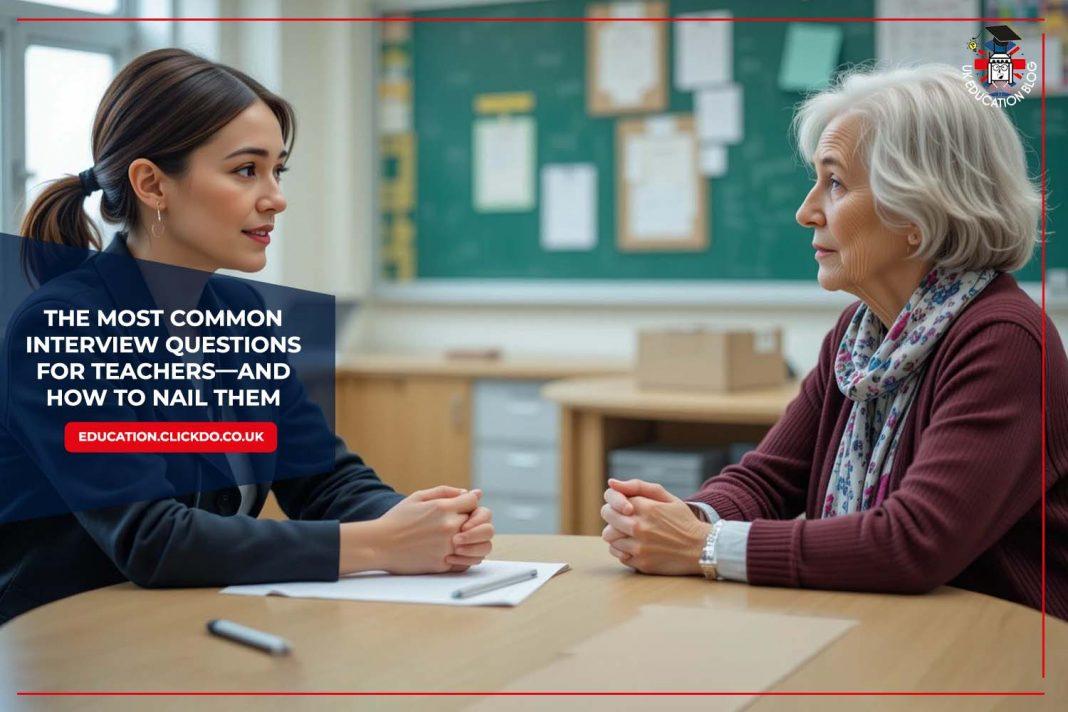Stepping into a teaching interview can be nerve-wracking whether you’re an Early Career Teacher (ECT) or an experienced educator.
This guide covers the most common interview questions and provides effective response strategies to help you showcase your teaching abilities with confidence.
Understanding What Schools Are Really Looking For

Beyond qualifications, interviewers assess:
- Your alignment with school values and culture
- Relationship-building skills with students, parents, and colleagues
- Adaptability and problem-solving approaches
- Commitment to professional growth
- Evidence of impact on student outcomes
Essential Q&A’s
A. About the Teaching Philosophy
1. “What is your teaching philosophy?”
For ECTs: “My teaching philosophy centres on creating an inclusive environment where every student feels valued and capable of success. I believe in balancing structured learning with student-led discovery, which I implemented during my placement at [School] where students showed measurable growth in both academic outcomes and engagement levels.”
For Experienced Teachers: “Over my [x] years in education, my teaching philosophy has evolved to emphasize evidence-based practices that support the whole child. At my current school, I’ve implemented a workshop model that increased student achievement by 22% while improving the classroom community. I’m particularly passionate about using formative assessment to create responsive instruction that meets students where they are.”
2. “How do you ensure all students are engaged and learning?”
For ECTs: “I’ve developed a multi-modal approach including visual supports, collaborative learning structures, and regular checks for understanding. In my student teaching, I noticed one student consistently disengaging, so I incorporated his interest in astronomy into our force and motion unit, dramatically increasing his participation.”
For Experienced Teachers: “Engagement begins with relationship-building and relevance. I start each year with interest inventories that inform my planning. When teaching a challenging poetry unit last year, I curated texts that reflected my students’ diverse backgrounds, resulting in 94% active participation compared to 76% the previous year. I also employ daily formative assessment strategies to identify and address disengagement immediately.”
B. About Classroom Management
1. “Describe how you would handle a disruptive student.”
For ECTs: “I believe in proactive classroom management built on clear expectations and positive relationships. I would first use proximity and non-verbal cues to redirect the student if a disruption occurs. If the behaviour continues, I’d have a brief, private conversation to understand the underlying cause. During my placement, I encountered a student who was calling out repeatedly. By having a quick chat, I discovered he was struggling with the content and acting out of frustration. Once I provided appropriate scaffolding, the disruptive behaviour resolved naturally.”
For Experienced Teachers: “My approach to disruptive behaviour focuses on understanding root causes while preserving the learning environment. In a recent case, I had a student who regularly derailed discussions. By analysing patterns, I noticed the behaviour occurred primarily during whole-class instruction. Implementing a ‘talk ticket’ system and providing fidget tools made the student’s participation more appropriate. I also collaborated with our school counsellor to develop self-regulation strategies, resulting in a 75% reduction in disruptive incidents over six weeks.”
C. About Curriculum and Planning
1. “How do you adapt your teaching to meet the varying needs of your students?”
For ECTs: “Differentiation is central to my planning process. I begin by identifying essential learning outcomes and then design multiple pathways to achieve them. During my training, I used pre-assessments before a fractions unit to provide targeted support for struggling students while extending learners’ work on applying concepts to real-world problems.”
For Experienced Teachers: “I maintain a comprehensive understanding of each student’s profile through ongoing assessment. When planning units, I identify potential barriers to learning and design proactive supports. During our recent argumentative writing unit, I created three instructional pathways based on specific skills—evidence integration, counter-argument development, and rhetorical devices—with students moving between groups as they mastered each element. This approach increased proficient scores by 34% compared to previous cohorts.”
D. Special Questions for ECTs
1. “As a new teacher, how will you handle the challenges of your first year?”
“I’ve created a detailed organisation system for planning, assessment, and communication that will help me manage workload efficiently. I’ve established connections with my mentor teacher who has agreed to continue offering guidance, and I plan to actively engage with the school’s induction program. I’ve identified specific areas for growth and have researched resources to support development in these areas. Finally, I recognise the importance of work-life balance and have strategies in place to sustain my energy throughout the year.”
E. Special Questions for Experienced Teachers
1. “What do you consider your most significant achievement in your teaching career?”
“My greatest success has been transforming our department’s approach to writing instruction. When I joined the team [x] years ago, only 47% of students were meeting proficiency standards. I implemented a workshop approach centred on mentor texts, targeted mini-lessons, and regular teacher-student conferencing. After documenting a 29% increase in my own classroom, I shared these results with colleagues and facilitated professional development to expand the approach department-wide. Three years later, our department’s writing proficiency rate has increased to 78%, with particularly significant gains among previously underperforming groups.”
F. The Questions You Should Ask
Asking thoughtful questions demonstrates your genuine interest:
- “How would you describe your school’s approach to [relevant area]?”
- “What professional development opportunities do teachers have access to?”
- “What systems or practices are in place to encourage collaboration among teachers?”
For ECTs, also consider asking about mentoring support and the evaluation process.
For experienced teachers, inquire about leadership opportunities and curriculum development.
G. Final Preparation Tips
1. Before the Interview
- Research thoroughly: Study the school’s website, Ofsted reports, and social media presence.
- Prepare your portfolio: Organise evidence that demonstrates your impact.
- Practice with purpose: Rehearse responses, focusing on authentic communication. For additional interview preparation strategies, Tradewind Recruitment’s blog offers excellent resources on mastering teacher interview techniques that complement the tips in this guide.
2. During the Interview
- Provide concrete examples from your teaching experience.
- Quantify your impact with data showing improved student outcomes.
- Listen actively to follow-up questions that indicate what the panel values.
Closing Thoughts
Teaching interviews assess not just your knowledge and skills, but your ability to form relationships, think on your feet, and embody values that shape exceptional education. By thoughtfully preparing for these common questions, you’ll demonstrate your potential to positively impact students’ lives and contribute to the school community. Remember that authentic passion for education and genuine commitment to student success will shine through prepared responses.
Author Profile

- Chief of Marketing
- As the Chief of Marketing at the digital marketing agency ClickDo Ltd I blog regularly about technology, education, lifestyle, business and many more topics.
Latest entries
 careerFebruary 20, 2026Top 10 Future-Proof UK Government Careers
careerFebruary 20, 2026Top 10 Future-Proof UK Government Careers  learningDecember 3, 2025Common Symptoms of ADHD: What Educators Need to Know
learningDecember 3, 2025Common Symptoms of ADHD: What Educators Need to Know Directory PostsNovember 12, 20257 Not-To-Miss UK Gaming Conferences in 2026
Directory PostsNovember 12, 20257 Not-To-Miss UK Gaming Conferences in 2026 Directory PostsSeptember 19, 2025The 15 Cheapest Dorm Room Essentials for University or College
Directory PostsSeptember 19, 2025The 15 Cheapest Dorm Room Essentials for University or College







